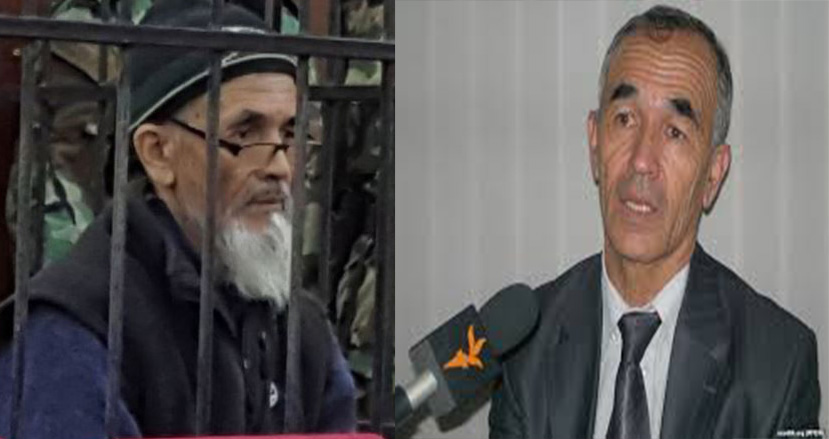After Six Years, Kyrgystan’s Only Imprisoned Journalist Has Become Unrecognizable

Caged like an animal, only bundled in a thick knitted hat and sweater, the skeleton-of-a-man watches his trial through metal bars.
Azimjon Askarov, 65, has grown thinner and weaker in the six years he has spent in a basement cell in Kyrgyz, according to photographs and people who have visited with him. Glasses sit on his sunken, shallow face; a scraggy white beard frames his straight-mouthed expression.
Askarov is the only journalist imprisoned in Kyrgyzstan, a central Asian country whose record on press freedom otherwise stands out as a positive example in a region of autocrats.
On April 21, 2016 the United Nation’s High Commissioner for Human Rights found that Askarov’s rights had been violated because of the inhumane treatment he suffered immediately after his detention and because of his inability to prepare for trial. The Kyrgyz Supreme Court ordered an appeal of his trial, which began Oct. 4.
The alleged human rights violations suffered by Askarov—the beatings he faced following his arrest and in pre-trial detainment in 2010—are not being taken into account as the Kyrgyz constitution requires, Masha Lisitsyna, a managing legal officer for Open Society Justice Initiative, said in interview with Capital News Service.
During his first week in detention, authorities isolated Askarov and severely beat him, according to the report filed on his behalf by the Open Society Justice Initiative and his lawyer to the United Nations’ Human Rights Committee.
“He was taken to the yard at the police station where a group of policemen started beating him until he almost lost consciousness,” according to Sondra Crosby, a doctor who examined and interviewed him a year later, said in an affidavit filed in his UN case. “He described sustaining hard punches from the front and back on his torso until he fell. When the police forced him to get up from where he was lying in the mud, they started beating him again.”
As a result, Askarov suffers post-traumatic stress disorder, said Crosby, who examined Askarov.
“The Kyrgyz majority and the state have been told and believe that this man is a murderer,” Katie Putz, a special projects editor at The Diplomat, told CNS.
A majority of police officers have ethnic Kyrgyz backgrounds, even in the south of the country, where many citizens are ethnically Uzbek. When a Kyrgyz officer was killed in the riots of 2010, and police claimed Askarov, an ethnically Uzbek journalist, incited the fatal rioting, the judiciary branch of government accepted the police’s statements.
Currently, the retrial is open to the media and human rights organizations, so everyone can hear both sides, said Kyrgyz Ambassador Kadyr Toktogulov, who also said the constitutional referendum was in no way related to Askarov’s case.
Kyrgyzstan’s Otherwise Good Record
Kyrgyzstan boasts the most democratic government in its region. Bordered by Kazakhstan to the north, China to the east, Tajikistan to the south and Uzbekistan to the west, the competition for best democracy isn’t very fierce.
The government became democratic following the 2010 coup. Since Kyrgyzstan became independent in 1991, the Kyrgyz people have staged two major uprisings overthrowing autocratic leaders.
“Since the first revolution, [the government realized] they can only go so far in pushing autocratic reforms,” Casey Michel, a freelancer for The Diplomat and other publications covering post-Soviet affairs, said in an interview with Capital News Service.
This allows for a relatively free press in Kyrgyzstan, Michel said. There is not only opposition journalism, but investigative journalism, he said. However, the press is under Russian influence.
Recently, Kyrgyzstan has looked to Russia as its globally powerful comrade.
Askarov’s Life
Azimjon Askarov did not begin his life as a journalist.
He attended Tashkent School of Art in Uzbekistan. In his earlier life, he was an artist and a designer.
In the early 1990s, he entered the world of human rights work after observing reports of police brutality in prisons.
“His wife was always complaining that he would not kill a chicken,” Lisitsyna told CNS. “When you live in a small town … you have your animals, and it was too much for him; he would never be able to do it.”
Regional news sites, including Ferghana News and Golos Svobody, published his writing.
In 2002, Askarov created the group Vozdukh. In Russian, Vozdukh means air; the name symbolized the idea that human rights should be as readily available as the air people breathe and impossible to live without.
At the same time, the Ferghana Valley was drawing international attention for the rise of Islamist Uzbek terrorism.
In 2003, Askarov’s investigation of a woman who had been beaten and raped while imprisoned led to her release, according to an investigation by the Committee to Protect Journalists, a nonprofit organization focused on journalistic rights.
In another instance, he was cleared of murder charges after traveling to Uzbekistan to find Mairam Zairova, the alleged murder victim. Askarov brought her into the courtroom, forcing the court to drop the case, according to CPJ.
“[People came to him because] it was a small town, he would be the only human rights defender for his area,” Lisitsyna told CNS.
Askarov, recipient of the U.S. Department of State’s 2014 Human Rights Defender Award, caused the job losses of police officers and prosecutors involved in cases of human rights violations.
Askarov documented the violent summer of 2010, when riots erupted between the Kyrgyz and the Uzbeks. He photographed and video recorded the injured and the brutality of the Kyrgyz police.
Because of Kyrgyzstan’s free press, Askarov’s reporting of the riots did not directly lead to his imprisonment.
Beaten Upon Arrest
The night of June 12 into June 13, Askarov had camped out on Saidullayev Street where the Uzbeks were putting up barricades, according to a post by Michel. Throughout the night he took notes and videos.
He returned home around 5 a.m. and fell asleep. His wife woke him around 9 a.m. with news that a police officer had been killed on a highway bridge in Bazar-Korgon, according to CPJ’s report.
When he arrived at the scene, Askarov found chaos. He begged people to be peaceful, but a man was shot and collapsed right in front of him.
The journalist rushed the man to the hospital. He spent the rest of the day identifying bodies at the morgue, conducting interviews, and continuing his documentation.
On June 15, two policemen approached Askarov in a car and took him to the Bazar-Korgon police station to question him about the riots. It was the precinct of the deceased officer, Maktybek Suleimanov. It was also the precinct from which Askarov had gotten officers fired.
When Askarov said he knew nothing about a distribution of weapons, he was taken to the station yard and beaten.
“While on the ground, a policeman put his foot on Mr. Askarov‘s neck while the rest of the men kicked him,” according to Crosby’s affidavit. “The men stopped the beating when they observed frothy sputum coming from Mr. Askarov’s mouth. Mr. Askarov believes he lost consciousness- [saying] ‘darkness came over me’. He recalls being forced to stand and then falling a second time. He reports being dragged to a cell with severe injuries to his chest and back.”
The journalist was detained for a week, during which time the police continued to beat him, Askarov told Crosby, a medical doctor specializing in torture victims.
“He was tied in a chair and hit hard on the left side of his head with a gun, which caused a bleeding wound,” the affidavit said. Since this injury, he reports he still has darkness that comes over his left eye.”
The officers threatened to rape Askarov’s wife and daughter to force a confession and held him on charges of inciting the riots and the murder of Suleimanov, the police officer.
An Unruly Trial
Prior to the trial, police ransacked his house numerous times, though Askarov’s fellow journalists had moved his family and much of his work to a safe location.
Someone also vandalized his office.
“The [Vozdukh] office was burned,” Lisitsyna told CNS. “There’s no office anymore.”
Askarov, and seven similarly detained Uzbeks, watched the trial from behind cage bars.
Suleimanov’s family and colleagues attended the trial, while family members of the defendants were barred from entering.
Suleimanov’s supporters acted violently and disorderly.
“One relative threw a glass at the cage, sending shards of glass towards them and one of the defense lawyers, Ms. Tatiana Tomina,” according to the report filed to the United Nations.
“At the end of the hearing, as the judge left the room, the police opened the cage and began beating the defendants. One officer kicked Mr. Askarov in the head, near his left eye, causing him to lose consciousness.”
Throughout the trial, continuous attacks prevented the defense from questioning the prosecution’s witnesses. The defense was also unable to call witnesses, as their lives were threatened before they entered the courtroom.
When the trial ended on Sept. 15, 2010, three months after Askarov’s arrest. He was found guilty and sentenced to life in prison.
After the appeals court found him guilty in November, the Kyrgyz Supreme Court took his case. Initially postponed for nearly a year, they too upheld Askarov’s life sentence.
Askarov Caught in Kyrgyzstan’s Ethnic Conflict
The conflict between the Kyrgyz and ethnic Uzbeks in Kyrgyzstan dates to at least 1990, one year before Kyrgyzstan’s independence, Martha Olcott, a Russian scholar and visiting professor at James Madison College, said in an interview with CNS.
In 1990, the Kyrgyz administration allowed its people to build on Uzbek farmland, which led to riots, according to a report by Human Rights Watch. Soviet troops stopped the violence between the two nationalities, however “the antagonism has stayed in place,” Olcott said.
Following the government takeover in 2010, the people of both ethnic groups in the south took advantage of the lack of police and military law enforcement in the region, Olcott said.
“Underlying tensions had boiled over,” Putz said. “The International Crisis Group did a report [and said about 70] percent of those who had been charged with crimes related to the unrest in the south were all ethnic Uzbeks, even though most of those who died and those whose homes were burned and were targeted were also Uzbek.”
Prison Time in a Basement
For six years, Askarov has been confined to a basement cell in prison colony 47, in Bishkek.
There, his health has deteriorated even more rapidly.
“He has difficulty breathing; he was complaining of more pains in his body,” Lisitsyna told CNS. “He’s walking like he’s so much older than his age. … If you saw pictures of him right before the arrest you would not recognize him.”
“He’s very sick,” she added.
In prison, he once again works on his art, sketching his fellow inmates using just a pencil and paper, according to an article in Voice of Freedom.
An exhibition in June 2014 featured Askarov’s artwork from before and after his imprisonment. The latter sketches show portraits of other prisoners. There is deep sadness in their eyes. Askarov titled his works “Guilty without Guilt".
Campaign
About this Site
Pressuncuffed.org seeks to encourage and promote rigorous student reporting, scholarly research and debate on the role of, and obstacles to, independent journalism in the United States and abroad. Our website features reporting by University of Maryland students about press freedom in the United States and abroad. It also offers resources to instructors elsewhere who may want to teach classes or hold workshops on this theme. In the near future, this site will become a place for student work from around the country and abroad.
Dana Priest, two-time Pulitzer Prize winner at The Washington Post and Knight Chair in Public Affairs Journalism at the University of Maryland.


